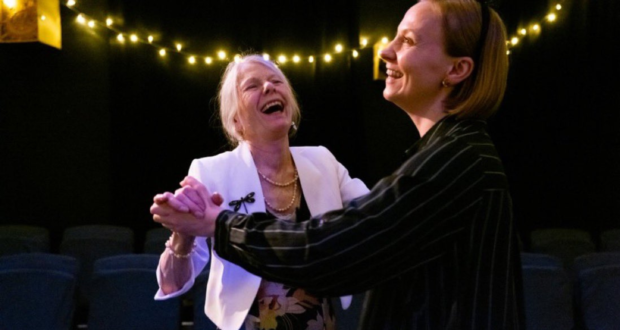A gently moving production that balances well-placed humour with an intensely dark subject matter to offer a brief but stirring exploration of Alzheimer’s.Summary
Rating
Excellent
Mixing comedy into drama is a tried and tested tactic of playwrights – humour can alleviate or even accentuate the darkest moments of a play. However, comedy and Alzheimer’s disease still seems an awkward combination. Alzheimer’s destroys someone’s cognitive functions and sense of self, which can make it hard to make jokes in such a context without them being at the expense of those suffering.
One Last Waltz manages to avoid this – Luke Adamson’s witty dialogue makes some of the play’s darkest moments bearable while preserving their emotional impact, and it always felt as though I was laughing with the characters, rather than at them. His writing creates concise and impactful dialogue that is often brutal in its honesty, never flinching from portraying the harsh realities of Alzheimer’s.
The play follows mother-daughter duo Alice and Mandy (Janna Fox and Judy Tcherniak) following the recent death of Alice’s husband George. During her frequent and often frustrating visits, Mandy sees her mother become increasingly forgetful, a fact they both struggle to come to terms with. Fox deftly embodies the constant stress of a fraught middle-aged Mum juggling her daughter’s education, an unreliable ex-husband and her mother’s declining health.
The production is packed into the single room above the Bridge House pub. JLA Productions have capitalised on this space – past mingles with present as the actors move between stacks of cardboard boxes, packed full of old books and photographs. The staging and set design are simple and powerful, evoking the clutter of a deteriorating mind yet never distracting from the actors’ performances.
As the play progresses, the action is driven by Alice’s wish to visit Blackpool again and dance in the Tower Ballroom, re-enacting with her daughter a cherished memory of her late husband. Adamson and Joseph Lindoe’s direction really shines here – Alice clutches her old dancing shoes to her chest regularly, and the symbolic power they hold is palpable.
Alice’s Alzheimer’s quickly reveals itself, throwing their holiday into disarray as she struggles to maintain a solid sense of time and place. Tcherniak puts on a stellar performance, capturing Alice’s growing frustration as she stubbornly refuses to be cared for, terrified of losing her independence. Emotional monologues to her dead husband capture the painful reality of old age loneliness, and a horrifying breakdown near the end of the play is genuinely upsetting.
Bumbling hotel receptionist Georgette (Julia Faulkner) provides the comic relief for these harrowing scenes. Her quiet wisdom means that, despite jokes often being made at her expense, she doesn’t simply serve as a comedic punching bag for the other characters. The development of her relationship with Alice is a joy to watch, and her search for moral redemption creates a compelling message of hope contrasting with the more distressing elements of the play.
The lighting complements these shifts in mood, filling the room with murky colours and muted tones to reflect Alice’s fading memory. No spoilers here, but the lighting is central to the crescendo of the play, beautifully accompanying a touching scene where the characters navigate an unavoidable obstacle that threatens to derail their trip.
One Last Waltz does feel quite short, clocking in at just under 80 minutes. The production’s scope and running time limit the content it explores, and I was left wishing the mother-daughter dynamic of Mandy and Alice’s deteriorating relationship was explored in more depth. Nevertheless, this production is still an affecting, impactful and sensitive portrayal of Alzheimer’s that will no doubt resonate with families affected by the disease.
Written by: Luke Adamson
Directed by: Luke Adamson and Joseph Lindoe
Produced by: JLA Productions
One Last Waltz plays at Bridge House Theatre until 17 June. Further information and bookings can be found here.
 Everything Theatre Reviews, interviews and news for theatre lovers, London and beyond
Everything Theatre Reviews, interviews and news for theatre lovers, London and beyond



